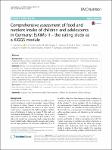Comprehensive assessment of food and nutrient intake of children and adolescents in Germany: EsKiMo II – the eating study as a KiGGS module
Barbosa, Clarissa Lage
Brettschneider, Anna-Kristin
Haftenberger, Marjolein
Lehmann, Franziska
Frank, Melanie
Heide, Karoline
Patelakis, Eleni
Perlitz, Hanna
Krause, Laura
Houben, Robin
Butschalowsky, Hans
Richter, Almut
Kamtsiuris, Panagiotis
Mensink, Gert
Background: As part of the second wave of the German Health Interview and Examination Survey for Children and Adolescents (KiGGS Wave 2), food and nutrient intake of children and adolescents aged 6–17 years living in Germany is assessed in EsKiMo II – the Eating Study as a KiGGS Module. Methods: EsKiMo II is a cross-sectional study, conducted from June 2015 until September 2017. The study population comprises 6 to 17-year-old study participants from the cross-sectional sample of KiGGS Wave 2 in 167 KiGGS sample points, which are revisited by trained nutritionists. Dietary intake is assessed by weighted food records during three consecutive days plus one randomly selected day within the following 3 months for children aged 6–11 years. Dietary intake for adolescents aged 12–17 years is assessed by computer-assisted dietary history interviews, reflecting the past four weeks, using the software DISHES. Further information, for example, about specific diets and dietary supplement intake, is reported during a standardised computer assisted interview for all participants. Food items are coded by the German Food Code and Nutrient Database (BLS 3.02). Discussion: EsKiMo II provides actual data on the dietary behaviour of children and adolescents living in Germany and their determinants. Results of EsKiMo II will be relevant for decision-making, measures, and evaluations within nutrition, consumer and health policy.
No license information

